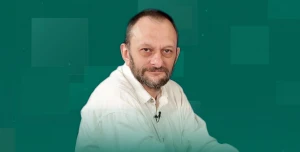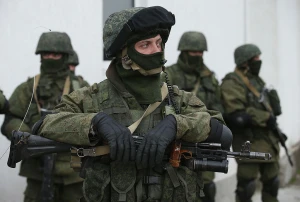
Putin’s expropriation of Western companies is step to ‘desert island economy’
The Kremlin's move to seize Russian assets of foreign firms will actually help the West by damaging the Russian economy
The Moral Rating Agency (MRA), the corporate watchdog, which rates global companies on how effectively they are pulling out of Russia, said this in a statement.
In response to Vladimir Putin’s decree expropriating the Russian assets of French company Danone and Danish company Carlsberg’s Baltika subsidiary, the MRA said that, in fact, it was a positive development because expropriations of Western companies will eventually help the West by damaging the Russian economy.
MRA founder Mark Dixon believes that by such a brazen attack Putin is shooting himself in the foot.
“Putin’s behaviour is reprehensible but he is unwittingly actually harming Russia. He has bitten the hand that feeds him. The more links that are cut between Russia and the West, the more the Russian economy will suffer. Russia will find it more difficult to finance its aggression and Russian people will become more disillusioned with the Russian regime as they become poorer.
It doesn’t matter whether the Russian economy is disconnected by Western government sanctions, Western companies’ ethical voluntary exits, or by Putin expropriating the assets of unethical companies. They all lead to Russia becoming disconnected from the global economy,” Dixon said.
As to Danone and Carlsberg, MRA says the companies deserve no sympathy because they continued to profit from Russia after the invasion of Ukraine and have therefore also supported the Russian economy which pays for the invasion.
“They have resisted our pressures to leave Russia and have ironically now been forced out by the very dictator they have been propping up. The fact that these companies have been punished by a global bad actor doesn’t make them innocent victims. They fully deserve their comeuppance,” Dixon explained.
Danone, the largest producer of dairy products in Russia, took in USD 3 billion in revenues in Russia last year, according to the Kyiv School of Economics (KSE). Beer-maker Carlsberg’s Russian subsidiary Baltika had USD 1.6 billion in sales in 2022, according to KSE.
The Western companies that are still in Russia are in hot water, the agency warns.
“The risk of expropriation has risen. It is a case of ‘once bitten, twice shy’ and they will find it difficult to sell their businesses. To reflect the risk of further expropriation announcements, they should write off their assets and expect their share prices to fall. The financial value of Russian assets has now moved closer to the negative moral value of these assets,” said the MRA’s founder, adding that Russia should have been unplugged economically when it invaded Ukraine on 24 February, 2022.
However Western governments failed to implement widespread sanctions and not enough Western companies have since voluntarily left Russia.
“Anything Putin does to disconnect Russia from Western investment and markets actually helps us finish the job we have failed to do fully ourselves. In addition to actual expropriations, Western companies will assess the risk of being expropriated on top of the embarrassment of being seen to profit from Russia. Russia is steadily moving in the direction of becoming a ‘desert island economy’.
If we can make Russia a ‘desert island economy’ it will be destroyed because Russia is more dependent on exports than any other major nation as a percentage of its GNP, producing vastly more oil, gas and minerals more than its own needs. This dependence on the West is Russia’s ‘Achilles’ heel’. If unplugged, it will not be able to survive as a stand-alone economy,” Mark Dixon pointed out.
The agency emphasizes that the West is already confronting Russia and must view the Russian economy as hostile.
“The West should not pull its punches but do everything to weaken the Russian economy. We are already fighting a proxy war with Russia militarily and are fighting a direct war for values. By any measure, Putin is an enemy of every democratic nation and person, and its economy must be viewed as an ‘enemy economy’,” the Moral Rating Agency said.
Mark Dixon explained why he believes the West should encourage the nascent trend towards two economic blocs in the world:
“Russia will become more and more dependent on China which is a much less rich market than OECD nations. If China supports Russia with excess trade to fill the gap, it will be doing something that hasn’t been economically viable today, just as Eastern bloc nations were forced to trade with each other before the break-up of the USSR. This inferior economic opportunity will be resolved either by Russia taking the hit on pricing or China having to subsidise Russia, which will only serve to weaken one or both of these undemocratic nations.”
The MRA believes the world needs to create a free market in which economic survival is the reward for democratic behaviour and economic failure is the consequence of undemocratic or totalitarian behaviour.
“Unplugging Russia is the first step to separate the world into two economic blocs, a ‘democratic market’ and an ‘undemocratic market’. Autocratic and totalitarian countries like Russia and China will cooperate with each other due to lack of alternatives and become poorer and less powerful together. The ‘democratic market’ will be many times larger and will make democratic nations much richer than countries run by dictators. If an undemocratic nation wants to escape poverty, it will need to become democratic. Its people will be motivated to remove their dictator so they can be welcomed into the ‘democratic market’,” Dixon concluded.
For reference: The Moral Rating Agency, the corporate watchdog, was set up to get Russia out of Ukraine. The MRA rates global companies on how effectively they are pulling out of Russia.
The focus of the Moral Rating Agency in the future will be to show the moral behavior of individual companies on a specific critical issue or involvement with a particular country harming the world or its own people.
The MRA was founded and is led by Mark Dixon, who runs the mergers & acquisitions consultancy ThinkingLinking in the City of London and New York. Mark has been opposed to autocratic regimes, particularly to the Chinese government and to Putin’s transformation of Russia from a nascent democracy into a fully-throttled autocracy. He has a personal connection with Ukraine because he has owned an apartment in the city of Lviv since 2010. He has also lived in China.
-
Last year, German companies transferred more money to the Russian budget than firms from any other EU country – only the United States is ahead
-
Foreign companies still contribute to funding Putin's war on Ukraine. According to research, just 17% of Western companies that had local Russian subsidiaries before the invasion of Ukraine, had left Russia
-
As of June 16, the NACP had added 29 companies to the list of international sponsors of the war. Among them are, in particular, Chinese Xiaomi and Great Wall, Hungarian OTP Bank, Austrian Raiffeisen Bank International, Bonduelle, French chain Auchan, German Metro and other companies.
-
On June 23, the NACP added Chinese car manufacturer Geely to the list of international sponsors of the war.
-
On July 3, 2023 The National Agency on Corruption Prevention (NACP) has added the British company Unilever to the list of international sponsors of the war
- News














































